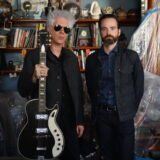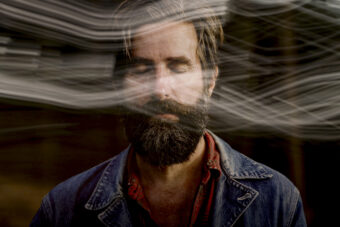Ever since his 1980 debut feature film, Permanent Vacation, writer/director Jim Jarmusch has deployed his idiosyncratic, underground films to detail the lives of fringe characters, be they hipsters, convicts, slackers, Elvis fans, or sword-wielding hit men. In his 11th feature film, Jarmusch trains his camera on one of cinema’s classic fiends: the vampire. Only Lovers Left Alive, which sees wide U.S. release this week, finds Jarmusch at his most romantic, telling the centuries-old love story of blood junkies Adam and Eve, played by Tom Hiddleston and Tilda Swinton.
Running counter to the glut of recent pop-cultural vampire fare, Jarmusch’s vampires are aesthetes of the highest order. When they aren’t sucking on Type-O popsicles and spinning Charlie Feathers 45s, Adam and Eve argue the merits of Motown versus Stax, collect vintage Gretsch guitars, recite the poetry of fellow vampire Christopher Marlowe, and cruise past Jack White’s childhood home in Detroit. And since there are no werewolves to battle, they instead lament the “zombies” that infiltrate the state of modern culture, and sneer at the lone vampire who calls Los Angeles home.
As with any Jarmusch film, the soundtrack is crucial to the story. Imagine Ghost Dog: The Way of the Samurai divorced from its RZA beats, or Bill Murray cruising through Broken Flowers with something other than Mulatu Astatke’s Ethiopian jazz on the car stereo. For Only Lovers Left Alive, Jarmusch turned to Dutch-born, Brooklyn-based lute maestro Jozef van Wissem. The duo have released three improvised duo albums in the past few years, so it made sense to have them collaborate for OLLA‘s soundtrack, which combines centuries-old lute motifs as filtered through 21st century drone-rock sensibilities. SPIN spoke to the two via phone about their chance first encounter, palindromes, and their favorite cinematic vampires.
You guys met by running into each other on the street?
Van Wissem: Yeah, I was walking in Soho and I saw Jim. I was a pretty big fan of his films so I just walked up to him and asked if he was interested in lute music. And he said yes.
Jarmusch: It was on the corner of Bowery and Prince Street, if I remember.
Jozef, what made you think that he would appreciate your music?
Van Wissem: I was aware of the musical choices in his films so I thought that he would be into it. I don’t know, it was a strange afternoon I guess, a lot of energy that day. I just saw him and — usually I wouldn’t have done that, but for some reason I walked right up to him.
Jarmusch: And I’m glad you did, because I went home later that day, looked at the CD and then I played it. I loved it so much and I realized that he was using some very beautifully minimal structures like palindromic structures. And he also had layered in very, very elegantly some ambient sounds he had recorded. Some concrete sounds, one being very light background sounds of the Schiphol Airport in Amsterdam. But just the whole thing was very haunting and I just loved it. People hand me a lot of stuff and I gotta be honest, a lot of it I just throw away. I don’t have enough time to listen to a lot of the things that I’m really interested in. But this really blew my mind, and then I got in touch with Jozef. We met somewhere for green tea and when we started talking about music, we had a lot of overlap in our interests in music and literature in other things.
What sort of music did you bond over?
Jarmusch: Well, you know, I’m a huge fan of 16th century music: Thomas Tallis, William Byrd and of course Henry Purcell. And Jozef deepened some information about John Dowland. But then we found that we were interested in all kinds of contemporary music from people like Luigi Nono and then to a lot of avant-rock. It’s a happy thing when you find someone from your own tribe and you can talk about Morton Feldman with, you know?
I was wondering how Jozef’s lute had helped to tell a love story in this film that went back hundreds and hundreds of years.
Jarmusch: His lute was essential. His music was inspiring even when I was writing early versions of this story. But the lute became very inspiring for several reasons. One, his approach has a kind of minimalism to it that is very strong and not intended to show off technique, but to employ the technique for result. Now that is very aligned with what became Adam’s character, his approach to music, who as we see in the film is capable of virtuosity but has partially abandoned it. Not that Jozef has done this because his technique is very strong and beautiful on the lute, but Adam is playing avant-rock drone stuff now. And also, the idea that both Jozef in his own life, his own interests as well as me, we love old things, new things, we don’t have a hierarchy, whether it’s William Byrd or My Bloody Valentine.
And that’s very important for the film and for Adam and Eve and for how I wanted them to be perceived as not having a sense of hierarchical culture. In other words, they’ll listen to Charlie Feathers rockabilly but they’ll talk about Franz Schubert or he’ll play Paganini or she’ll read classical literature and modern things as well. It was a kind of key to everything. Jozef’s playing was both an inspirational element of the film, and an essential element for construction of the film as well.
Van Wissem: It felt so timeless, I think — the vampire thing, and then the lute and then the music. You dream about space and ultimately timelessness, and I think that goes well with the story and what it became.
I’m curious if either of you watched the Twilight series at all.
Jarmusch: I don’t watch any of that stuff. I didn’t see any of the Twilight things or what’s the other vampire TV show?
True Blood.
Jarmusch: Yeah, I didn’t see any of those things. The vampire thing, I’ve been fascinated with its history in English literature, as well as its history via film, starting with Carl Dreyer’s 1932 film Vampyr. And then of course so many interesting films: Tony Scott’s The Hunger, George Romero’s Martin, Catherine Bigelow’s Near Dark, Abel Ferrara’s The Addiction. Michael Almereyda also made a vampire film, Nadja. Clair Denine made a strange film, Trouble Every Day. Let The Right One In, Tomas Alfredson’s film from 2008, was really beautiful. And none of these are your standard kind of vampire stories. They’re all kind of odd and poetic on some level.
You mentioned Jozef using palindromic structures — and on his first album, he played old lute scores backwards, suggesting these musical reflections. So I wonder if Jozef thought about the irony of scoring a movie about vampires, who themselves have no reflection.
Van Wissem: Yeah, that’s actually a very nice way to put it. Back then, I wrote really elaborate palindrome structures. I guess now I still do, but I try to write more melodies, and more synching melodies. Technique is kind of like a ballast; You try to get away from it. So the palindrome thing, it’s kind of like in the beginning I used that a lot. And I feel like repetition allowed for a deeper listening experience. You know, where you hear something and it’s more about that really then what’s between the notes.
Jarmusch: What Jozef said is interesting to me too because I don’t want the shot or the way the camera moves to be in and of itself a thing that we’re showing you. The camera moves a certain way for the content. And a lot of people go crazy with the technique that doesn’t serve — it only serves itself. Certain mainstream movies have a thing where no shot is on longer than three seconds. I will turn that shit off. Even if it’s from a really good director like Tony Scott. When they start doing that shit, that’s it for me, I turn the shit off. That’s insulting to me that there’s only three seconds per shot. Like come one, man, you’re messing with my rhythm of my blood flowing through my veins here. I don’t like that.
So anyway, I don’t know where that tirade came from. It drives me nuts.
Only in the Bourne trilogy could I handle those kinds of rapid jump cuts.
Jarmusch: It’s not good for your brain, you know? It’s not good for your soul. It’s not musical anymore.
//www.youtube.com/embed/VYcblBXLPR8





